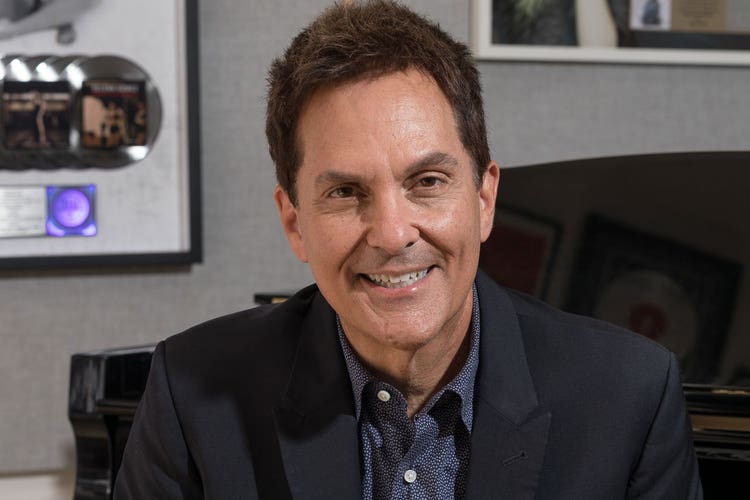Build Your Voice and Change the World With Celebrity Voice Coach Roger Love

“You are not the voice you were born with,” says the world’s number one celebrity voice coach Roger Love. “You were born with an instrument, but nobody showed you how to use it.”
Case in point: Bradley Cooper, whom Love has just coached to a stunning performance in “A Star Is Born” with Lady Gaga. Cooper proved to be an incredibly diligent student, arriving at Love’s studio at 7:30 every morning, ready for his voice lessons. “We found out that he was born with a great instrument. He just never learned how to play it,” Love says. “So I tuned it all up, and then we worked on all the songs.”
The film’s premiere, Love says, left him speechless. “[Cooper] not only holds his own singing duets with Lady Gaga; he sounds amazing.” Already, critics are speculating that the film has Academy Award potential, and it wouldn’t be the first time Love has coached such a performance: Actor Jeff Bridges won an Academy Award for “Crazy Heart,” and Reese Witherspoon’s star turn in “Walk the Line” earned her Best Actress.
https://www.youtube.com/watch?v=6ZVfyrJkt-0
Love’s coaching career began when his voice coach needed someone to manage his studio while he taught a master class in Canada. Without any other options, he asked Love, and the 16-year-old began working with Brian Wilson of The Beach Boys and then Earth, Wind & Fire and The Jacksons. When his coach returned, the clients decided to stay with their younger instructor. Today, Love’s clients include superstars from John Mayer to Selena Gomez, mega-groups from Maroon 5 to The Killers, and the cast of “Glee,” contestants on “The Voice,” and many more.
A who’s-who list of personal development gurus, from Tony Robbins to Brandon Burchard, Suze Orman and Louise Hay count Love as their coach, as well as Fortune-ranked companies and industry-leading corporate executives, doctors and entrepreneurs.
A drive to connect

What draws these speakers and singers—regardless of industry, expertise, or job function—to Love?
Their shared desire to connect.
We respond to sounds that move us emotionally, whether they are sung or spoken. Love trains students in vocal fitness—not only to perform, but also to emotionally connect with their listeners so they can more effectively and powerfully align their intentions with how others perceive and understand the words they’re saying or singing.
Love notes that sound evokes emotion and connects people in ways that text and even images might not, and that’s all the more reason to learn how to use our voices. That explains why vocal fitness and vocal hygiene are important. “Train your voice so that it is capable of making every sound that you want to make to move people emotionally and to have great communications,” he says.
Control yourself

While we’re hyper-focused on our appearance, Love points out that our voices make an instant impression with profound lasting effects. The way we sound may prompt others to judge us as intelligent, trustworthy, friendly, and confident, or aggressive, disinterested, uneducated and so on.
“People think that they have only one voice and that’s the sound they should make all day and night. But we all play many roles in life—parent, colleague, friend—and those roles require different sounds. If you only know how to sound one way, it’s going to be much more difficult for you to be successful in every area of your life,” he says. What’s more, the sounds we communicate can cue listeners to pay attention or tune out what we have to say.
Vocal fitness is integral to health

Research points to the health benefits of singing, including the release of endorphins that make us feel happier and calmer and that help fight against infection and beat stress. These benefits could add up to a healthier and longer life, Love says, and daily practice following his singing and speaking protocols supports not only more rewarding interaction with others: “Learn to play your voice, how to keep it healthy, and then how to use it to make people happy and healthy, especially you.”
With small tweaks, Love says anyone—any age, any gender, any ability—can learn to speak productively. “Most people don’t breathe correctly,” he says, “so I teach them how to breathe and how to send just the right amount of air to the vocal cords.” He has simple breathing and sound exercises that train students to control the position of the vocal cords, which he compares to learning to position your fingers on a piano or a guitar. Control over the vocal cords and air makes it possible, he says, to be able to access your full vocal range and the emotions associated with each part.
Love’s techniques have helped thousands of people achieve their goals, from a student who was finally able to overcome his debilitating stutter to the university professor who transformed her voice and others’ perceptions of her to become the first female chair of her department.

Sound tips

Despite the power of sound and the potential our own instrument has for our health and happiness, Love says people don’t usually think about it until they lose their voice. Besides a wealth of tips and exercises for vocal fitness, Love dispels some misconceptions and wants us to break some bad habits.
1. Breathe in through the nose. Love says this makes the air coming into the lungs moist, while inhaling through the mouth does not—and can lead to vocal fatigue.
2. Sounding confident will make you feel more confident. People judge your emotional state from how you sound, says Love. If you want to feel more confident, sounding more confident will cue your listeners to perceive you as confident and make your body feel that way.
3. Sound patterns can have the same emotional effect on our listeners, regardless of whether we’re speaking or singing to our listeners. For example, ascending melodies can sound positive and suggest there is more to come. Love advises ending your sentences on a higher note to encourage the listener to follow you to the next sentence. Descending melodies, on the other hand, signal an end to a thought or sentence. “They communicate, ‘I’m through,’” he explains—not exactly the best tones to use when making a proposal to a client or asking your child to finish getting ready for school.
For all his famous clientele, Love isn’t only interested in celebrity status. “I’m trying to make the world a better place, one voice at a time,” he says. “When you find your voice and people hear you, and they like you and want to be in relationships with you, you can change the world.”
Editor’s Note: Roger Love is offering 24Life readers and 24 Hour Fitness Members the opportunity to find your perfect voice and learn his techniques and purchase “The Perfect Voice Complete Collection” at a very special price.
Visit the theperfectvoice.com and select “Pricing,” then choose “The Perfect Voice Complete Collection.” On the checkout page, enter the promo code 24HF where prompted. Click “Apply” to receive $50 off the regular price of $147 and pay just $97 for the entire collection. Click to complete your purchase and watch for log-in credentials via email within about 10 minutes.
Video credit: Tom Casey, box24studio.com
Photo credit: Tom Casey, box24studio.com; Roger Love; bruno135_406, Adobe Stock
Hair & make-up: Chanel